Activities
Briefing about ENDURE project’s activities during Social Boundaries of Work conference in Wroclaw, Poland 16-18 October, 2024
On 15th of October, representatives of Wroclaw University involved in the activities of Cluster 2, namely Dr. Mateusz Karolak who is also principal investigator of the project from Poland and PhD candidate Könül Jafarova held the panel entitled “ENDURE: Resilience Lab” during “Open Day” in the framework of the conference of “Social Boundaries of Work. Critical Labour Studies in the Times of a Polycrisis” organized in Wroclaw, Poland. The panel discussions moderated by journalist Olga Gitkiewiczwere held around the issue of collective resistance of migrants in crisis situations, including pandemic. Representatives from trade unions, including the Couriers’ Trade Union (Ivan Strzeblicki), the Trade Union of Latin American migrant workers in Poland (Gabriel Montoya and Rocio Flores Torres), the Workers Initiative (Ignacy Jóźwiak) and the Ministry of Family, Labor, and Social Policy of Poland (Marcin Wiatrów) participated in the discussions. After the presentation delivered by Dr. Mateusz Karolak and Könül Jafarova about the findings on the unionization of essential migrant workers in Poland, the panel was open for discussions and reflections both by migrants participating in the panel and the state agency as well as the public. The discussions evolved around the issues of how migrant workers organize themselves, and what steps can be taken to increase their activism in Poland.

The following day, on 16th of October, a session was devoted to the entire “ENDURE” project team working on a collective volume highlighting global dimensions of workers resilience, resistance and livelihoods during the pandemic. The session covered the presentations of the chapters included in the book based on the evidence from Poland, Germany, Croatia, Colombia, Brazil, Romania and Türkiye and provided an opportunity for the feedback and reflections from the external conference participants. The presentations were delivered by the authors of the chapters both in person and online format.
________________________________________________________________________
A new microsite for the research on textile activism

In Colombia the research seeks to understand the COVID-19 crisisholistically as a new source of mobilization of societies. In particular,it focuses on understanding this period through the experiences andpractices of textile activisms that emerged during the pandemic or wereaffected by it. The microsite proposes a virtual meeting space, in whichthe process and results of the research are progressively deployed,offering forms of visualization of the textile activism initiativesidentified as part of a broad scene of mobilization. In the same way, thisvirtual space is configured as an archive, offering multimedia recordsthat can contribute to processes of analysis and understanding of thisdenunciation technology through its repertoires, causes and forms of organization. In this sense, the page provides an account of the calls andlaboratories carried out throughout the research, contains methodologicaltools used for this purpose, as well as access to the products resultingfrom the analytical process: databases, papers, podcast, interactivevisualizations, photographic galleries that show the role of textiles insocial mobilization during this period and a virtual encyclopedia on themeanings and repertoires of activism. Read more here
MANIFESTING CARE
Community Resilience Laboratory ComRes-Lab 2024
Textile activisms in times of pandemic and social unrest
Image for social networks of the official piece of the event. Illustration Sylvia Gómez Gómez
Between January and April 2024 we carried out, together with the textile activism collective Miércoles de Chicas Ardidas, the Community Resilience Lab ComRes-Lab 2024: Manifesting Care. This initiative was developed in Bogota as part of the final phase of the empirical work of the research: Inequalities, community resilience and new modes of governance in a post-pandemic world.
This laboratory sought to accompany and support the themes and actions that the collective, Miércoles de Chicas Ardidas mobilizes through their annual artistic meeting that, in the framework of the Working Women's Day and the International Day against Gender Violence, convenes and activates networks to build collective memory, generating encounters between different creative, social and community processes. In this version this meeting was deployed in three collaborative work spaces:
1. " Domestic Dialogues" a temporary sewing space for the participatory creation of an artistic textile product in alliance with the Union of Domestic and Independent Workers, SINTRAHIN.
2. The creative writing workshop to compose the manifesto of care in textile activism facilitated by Juliana Muñoz Toro, Colombian writer, teacher in literary creation and textile narratives.
3. "Manifesting care", an event of appropriation of public space with simultaneous activities such as the ephemeral exhibition of textile pieces made for activism in the Covind 19 Pandemic pandemic and the subsequent social outburst in 2021, collective embroidery and handmade printing of garments to position reflections and exchanges of knowledge. The theme of these activities was care among women, from a political, cultural and artistic point of view.
Domestic dialoges
Activity: Temporary sewing space (3 meetings)
Theme: Caring for caregivers in times of pandemic and social explosion from the point of view of domestic workers affiliated to the Union of Domestic and Independent Workers, SINTRAHIN.
Participants: Sindicato de trabajadoras del hogar e independientes, SINTRAHIN (Union of domestic and independent workers) and embroidery teachers
Dates: 2, 9 and 16 of March and 14 of April, 2024
Temporary sewing space: DOmestic Dialogues. March 2, 2024. Photo: Sylvia Gómez Gómez
Socialization of the Domestic Dialogues. Participants and textile pieces elaborated in the ephemeral exhibition Manifesting Care. April 14, 2024. Photo: Johanna Morales
Manifesting care
Participants: Various textile activism initiatives, and members of SINTRAHIN (Union of domestic and independent workers)
Theme: Care among women in the exercise of textile activism to sustain the processes within the initiatives in the pandemic and the social outbreak.
Date: April 14, 2024
Place: Biblioteca al Parque, Parque Nacional. Bogotá
Collective embroidery table for the textile illustration of the Manifesto created in the creative writing workshop. Photo: Johanna Morales.
Embroidery picnic and screen printing station. Photo: Johanna Morales.
Guided visit to the exhibition of textile activism pieces during the pandemic. Photo: Johanna Morales.
Visit to the Observatory of Sustainable and Healthy Territories of Bocaina Mountain Range (OTSS): 1.11 - 5.11.2024
In early November 2023, Aline Yuri Hasegawa, Sofia Cabral Santalucia, Cintia de Paula Santos Nascimento and Cristina Alejandra Larrain Manzo from the Brazilian UNICAMP team visited the OTSS, established through a partnership between the Forum of Traditional Communities (FCT) of Angra dos Reis-RJ, Paraty-RJ, and Ubatuba-SP, and the Oswaldo Cruz Foundation (Fiocruz).
The Observatory operates in indigenous, quilombola, and caiçara territories in the locations of Angra dos Reis, Paraty, and Ubatuba (and other municipalities that have more recently joined the network), implementing a variety of projects such as basic and ecological sanitation, agroecology, community-based tourism (CBT), education, and health among others. The purpose of these projects is to protect the territory by promoting the well-being of the communities involved. The threats faced by these territories include pressure from real estate speculation projects, external tourism, ICMBIO and IBAMA restrictions on hunting and establishing farms, contamination from waste left by operations such as Petrobrás' oil extraction platforms, and the construction of new highways like BR 101, which threatens to divide the territories.
The trip included a visit to the village of Araponga, in the Guarani Indigenous Land of Araponga. The pandemic was a challenging period for the indigenous village. According to the chief, there were no losses in Arapongas, but neighboring villages lost many relatives. Additionally, remaining isolated made it difficult to generate income from selling crafts in the city.
The implementation of the "Care and Resist" project, carried out within the context of the Forum of Traditional Communities, was crucial to ensuring subsistence during the pandemic. The village received food baskets and gas, and young individuals like Juninho also contributed to delivering these baskets to other communities linked to the Forum. The project lasted for several months, but the community wished for its extension. In this community's case, their involvement in the campaign was as recipients of food and supplies. They did not donate supplies, but the youth contributed by mobilizing in the distribution of the baskets. The pandemic also had a very negative impact on education from the elementary level, as they did not have access to the continuation of studies during the two years of the pandemic, delaying the educational development of the village's youth.
Later, in a conversation with Silvio, a leader and resident of the quilombo, we heard accounts of past successful projects, such as the creation of seedlings and nurseries that initiated research on the handling of the Jussara fruit. This fruit has become an important item on the quilombo's households and restaurants’ menu. Silvio himself has specialized in bioconstruction and shares his knowledge throughout the forum's territory. Additionally, in collaboration with researchers from Fiocruz working at the observatory, the biodigester system was mentioned. This system supplies gas to the quilombo's restaurant and is responsible for sustainable sewage treatment. It not only produces gas from waste but also acts as a biofertilizer. We had the opportunity to see the model and facilities.
We also spoke with the leaders Danielle, coordinator of the Association of Residents of the Campinho da Independência Quilombo (AMOQC), and Ariane, treasurer of AMOQC, who emphasized the role of women in the process. Among them, Neusa Gusman, who at the time prepared a report on the quilombo's occupation history, a document that was crucial for the recognition of the territory. Also mentioned were Rio de Janeiro Governor Benedita da Silva and Abdias do Nascimento in the recognition process of the first quilombola community in Rio de Janeiro, which granted them territorial rights. In 1994, the residents' association of Campinho was organized amid the advance of real estate speculation and the construction of the BR101 highway, which divided the territories. The highway became a catalyst for conflicts and lifestyle changes within the quilombo, as it led to the return of landowners who sought to reclaim the land, a dispute that lasted 30 years until the land demarcation in 1999.
From this historical struggle, the quilombo community engaged on cultural and artistic projects, income generation, and tourism organization. The latter was consolidated in 2007 with the opening of the community restaurant, agroforestry system, political training, community plant movement, among others. The construction of the community restaurant and the practice of Community-Based Tourism allowed people to return to work within the quilombo, generating income for the community and reviving traditional practices, such as the recovery of old culinary recipes.
With the declaration of the pandemic in 2020, networked efforts and the involvement of the youth from the Forum were crucial to preserving the health of the elderly, who were considered a high-risk group. These initiatives avoided contamination and population losses within the period. Initially, they had to register all families and access public policies (government assistance), and later, with the Observatory and Forum's coordination, over a ton of organic food, basic food baskets, and fish were distributed. The next battle was to ensure that communities were vaccinated, and they fought to overturn the Supreme Court's injunction. Three informative videos were produced during the pandemic. The priority in food distribution was for mothers with children, the elderly, retirees, and the unemployed.
At times, accessing external resources was challenging. For this reason, there was a return to traditional quilombo practices, such as planting, Jongo, and traditional cooking. Regarding the quilombo's participation in the "Caring is Resisting" project, it involved receiving and distributing basic food baskets. Initially, they came from donations, but over time, products produced in the communities and surpluses from family farmers were included. This facilitated an exchange between Traditional Communities, involving food produced in exchanges with fish caught in communities near beaches and rivers. Currently, the surplus food production in the quilombo is sold to the National School Feeding Program (PNAE) and converted into school meal provisions.
Fieldwork: Resilience, solidarity networks and community self-management in the quilombos of the Ribeira Valley, Brazil
Taking a holistic approach to the study of the pandemic, the ENDURE Project team in São Paulo discusses the experiences of community mobilization and solidarity action in traditional black communities.
Ribeira Valley team: Ana Carolina Marcucci; Carla Águas; Cintia Nascimento; Erica Dias; Iraima Lugo; Joabi Silva; Lucas Silva; Maíra Silva; Manuela Rocha; Manuela Rodrigues; Marina Fontolan; Matheus Barros
Food security was one of the main strategies for dealing with the Covid-19 pandemic in traditional black communities, the so-called quilombos, in the Vale do Ribeira region, Brazil. This has been the focus of research by the São Paulo team of the ENDURE project, analyzing two actions carried out by these groups, which point to networking strategies and resilience processes.
The first project is the Emergency Plan drawn up by the Vale do Ribeira Quilombola Farmers’ Cooperative (Cooperquivale, in Portuguese) and its partners, which has resulted in 330 tons of food donated to around 45,000 people living on the outskirts of large cities in the state of São Paulo between May 2020 and February 2022. Before the health crisis, farmers used to send a large part of their produce to schools, through programs run by the Brazilian Ministry of Education. With the closure of schools during the pandemic, the Emergency Plan made it possible for production to flow and, at the same time, contributed to food security for the most vulnerable populations in urban areas.
The second project discussed by the São Paulo team refers to the formation, during the Covid-19 pandemic, of the Empowered Women Cultivating and Learning Group (GECA). Created in the quilombo of Nhunguara, the project was set up by a group of women who found themselves more vulnerable when faced with the risk of food insecurity, death and loss of income. They came together to recover the production of manioc flour, an ancestral crop of the region, using traditional planting techniques. The women mobilized funding, built a flour mill and started planting manioc and other crops. In addition to the search for economic autonomy and food security, they began to promote other activities, such as dance classes and workshops.
Both experiences point to the debate on community self-management, solidarity networks, belonging to the territory and food autonomy in order to think about resilience during periods of stress. To carry out the research, the team has been analyzing secondary sources (books, articles, films, etc.) and conducting fieldwork.
The first fieldwork, in June 2023, was an exploratory visit to collect preliminary data. The second fieldwork took place in August, during the 14th Traditional Seed and Seedling Exchange Fair of the Quilombola Communities of the Ribeira Valley, promoted by nineteen community associations. The fair is the main activity to safeguard the Traditional Quilombola Agricultural System of the Ribeira Valley, recognized by National Historical and Artistic Heritage Institute (IPHAN) in 2018 as a Brazilian cultural heritage site. The third stage took place in October 2023, during the 1st Celebration of the Formation of the GECA Group, which consisted of a feast in praise of St. Jude Tadeu, protector of impossible causes.
Next steps: participatory methodologies
The next stage, to be carried out in the first quarter of 2024, will use participatory methodologies to deepen the discussion about the pandemic, food security and resilience in the context of traditional black communities. By setting up Community Resilience Laboratories (ComRes Labs), the team will promote conversation circles, joint planting efforts and other activities that will seek to expand data collection and establish a horizontal university/community dialog.
Dissemination of results
The São Paulo team’s partial research results have been systematized and disseminated through participation in scientific events and publications. Among these initiatives, the research was the focus of the team’s participation in the First Decolonial Praxis Congress, promoted by the University of California, Riverside. In January of this year, the team will participate in the second edition of the congress, addressing the activities of the GECA Group. Cooperquivale’s Emergency Plan was the focus of a paper that will be included in the book Decolonial Praxis (in press), to be launched by the same university.
To learn more about Cooperquivale’s Emergency Plan, watch the film From quilombo to favela - Food for black resistance (subtitled in English), available at https://www.youtube.com/watch?v=QgQkqt2auXc.
Visit to the FU Berlin by Adam Mrozowicki
Adam Mrozowicki (U Wroclaw) visited the FU Berlin team in 4-8.12.2023 in the framework of the Erasmus staff mobility program, giving several lectures and using the chance to work on Cluster 2 of the ENDURE project. In the fifth round of the biographical interview analysis workshop, the team members in Cluster 2 focused on an interview conducted by Christian Fröhlich (FU Berlin team) with an elementary school teacher in Berlin.
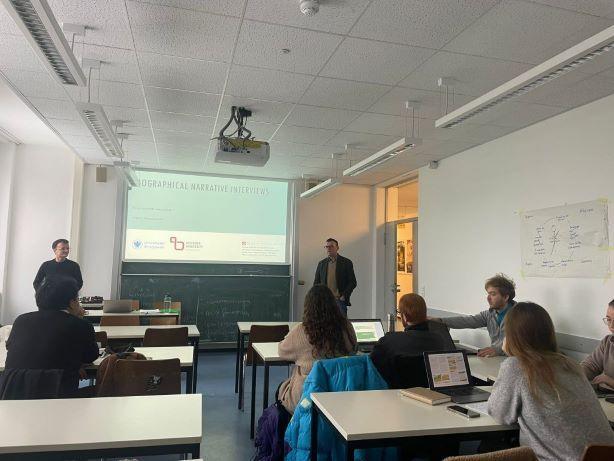
Endure Project Cluster 4 presented the challenges of the data analysis in a transnational research project at the Rajapintapäivät event (16.11.2023)
The team of Cluster 4 of the Endure TransAtlantic Project, in collaboration with the University of Helsinki, delved into the complexities of transnational data analysis during a workshop on the 16th of November as part of the Rajapintapäivät event, the Interface Days, an open and free event for everyone interested in social science information technology research and the use of digital and computational methods.
Focused on understanding societal responses to the COVID-19 pandemic, the Cluster 4 team gathered data from 6 million tweets across Poland, Germany, Brazil, and Finland.
Emilia Palonen led the event, with all the countries participating in comparing how diverse political landscapes addressed pandemic challenges, mainly using topic modelling to understand the polarised and hegemonic discourse.
Mateusz Karolak, from Poland, Christian Frölich, from Germany, and Juha Koljonen, from Finland, took part in the event online and shared their findings with the onsite researchers, Salla-Maaria Laaksonen, Juho Pääkonen, Henry Jokinen, Virpi Salojäarvi and other attendees.
Kleber Carrilho also presented some results on the findings about Brazilian health authorities' data from a paper developed with Emilia Palonen. The workshop also invited researchers facing similar challenges to share strategies and questions, emphasising practical data analysis using Tableau.
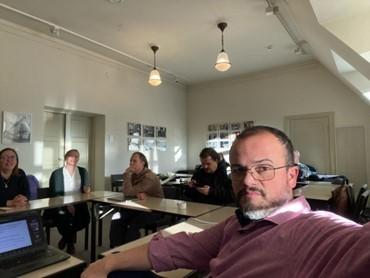
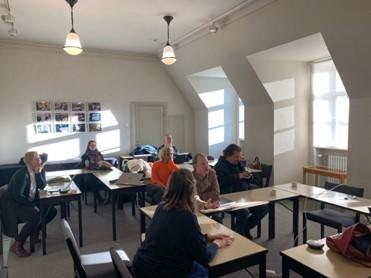
ENDURE's participation at the Society of Social Studies of Science (4S) conference in Honolulu (8-11 November 2023)
The annual meeting of the Society for Social Studies of Science (4S) was held in Honolulu, Hawaii, in November 2023.. For this conference, Marina Fontolan, Carla Ladeira Pimentel Aguas, Soner Barthoma, Leda Maria Caira Gitahy, and Mihai Varga organized a panel entitled Social aspects of the Covid-19 crisis: Inequalities, Resiliences, and Knowledge Production. The panel abstract is the one that follows: “The Covid-19 crisis had affected the entire world differently. World inequalities became more apparent than ever before. Even today, not all countries and regions of the world have reliable access to Covid-19 vaccines, medicines, masks, oxygen or even information. This panel aims at discussing the Covid-19 crisis from a Science and Technology Studies perspective: thinking about the mid and long term effects of this crisis from the most varied STS perspectives. We are looking for papers that discusses issues related (but certainly not limited) to: Drivers of inequalities and new forms of (de-)mobilizations: how the various dimensions of inequalities (gender, race, ethnicity, age, and migratory status) have been reinforced or challenged during the pandemic; How different communities built resilience strategies to survive through the study of grassroots solidarity movements and the mobilization of social groups and communities to generate social and political collective action; Governance and (De-)Mobilization: to analyze Covid-19 governance in different instances, exploring social, political and ethical consequences of these governance practices on social inequalities, political systems, people's rights, and freedoms across the globe; Social Media and the Covid-19 pandemic: the sources and promotion of dis and mis-information (as well as resistance discourses in form of public science and science disclosure endeavors) in social and mainstream media and to assess social media's empowering and repressive roles in the context of the pandemic”. The panel included a total of 15 presentations and allowed for in-depth discussions on the social issues of Covid-19. It was divided into 3 interrelated sections that allowed us to explore several of ENDURE project's research themes..
The first section had a focus on social media and mask making. The papers presented on social media allowed us to better understand how disinformation circulates and how it is similar in nature and content, becoming an arena to demand changes in policy and how the pandemic should be tackled.. The paper on mask making showed how people initially perceived cloth masks as a safe option and continued to use them, even in combination with surgical masks when they realized they were not as effective as they had hoped be.
The second section featured papers that focused on long covid challenges, expertise and technological issues of the pandemic in general. The paper on long covid showed how this is becoming a neglected disease: people who suffer from it do not usually receive appropriate care and are usually dismissed by their loved ones as their families do not understand or do not want to deal with the reality that Covid-19 is still a problem. The papers on expertise discussed how the idea of who is the expert was constructed throughout the pandemic and how they were held accountable by changes in policies. The paper on the use of contact technology showed how the use of apps spur into making inequalities clear: people without access to smartphones and the elderly felt constantly excluded from their right to come and go.
The final section focused entirely on policy making during the pandemic. The papers showed how governance was carried out during the worst moments of the crisis, and how knowledge production and contested data came into play in developing policies to contain the pandemic. These experiences showed how geopolitical challenges and issues were both at the forefront and in the background of several decisions taken.
In conclusion, the panel held a great diversity of papers that showed how Covid-19 is still an issue and how the pandemic has made the theme that is still in need of further research.
Community Resilience Labs: ENDURE project in Colombia (July and August 2023)
Laboratories "Textile Activisms in the Pandemic" – Bogotá and Medellín
During the months of July and August 2023, we conducted two (2) laboratories in Bogota and Medellin with the objective of providing a space for recognition among the initiatives identified in those cities and collectively speculate on the characteristics and meanings of the textile activisms that emerged in Colombia between 2020 and 2022, taking as context the COVID - 19 pandemic and the social upheaval of 2021.
The invited initiatives to participate in the laboratories were identified from a public call made through social networks between March and June 2023. The results of the call offered us a broad overview of textile activisms and the causes they mobilize, being the information obtained the axis of reflection of these meetings.
The laboratories were configured as ephemeral exhibition scenarios to get to know each of the experiences from their textile pieces, making visible the materiality as a subject that generates interactions and embodies specific knowledge that configure modes of social mobilization that interweave public and private space, care and denunciation, clothing and textile posters to manifest social demands.
The purpose of the methodological proposal was to invite conversation, reflection and exchange of textile activism experiences, through the presentation of the results of the call. Thus, the geographical location of the participating initiatives was visualized, in Colombia, and in each of the cities, and a timeline with the main milestones of the social upheaval, the pandemic, and the dates of emergence of the different initiatives, which allowed to dimension spatially and temporally the incidence of these actions and the emotional communities, of sense and affection (Jimeno, 2010 Jimeno et al, 2019) that are constituted with the textile as process and materiality, evidencing networks that sustain and shelter organization and mobilization. Likewise, a circle of conversation was introduced around the specific experiences of the initiatives.
These meeting spaces in Bogota and Medellin made it possible to reflect on what makes textile to social mobilization and to advance in the characterization of what textile activism in Colombia has been in the context of the pandemic and the social upheaval.
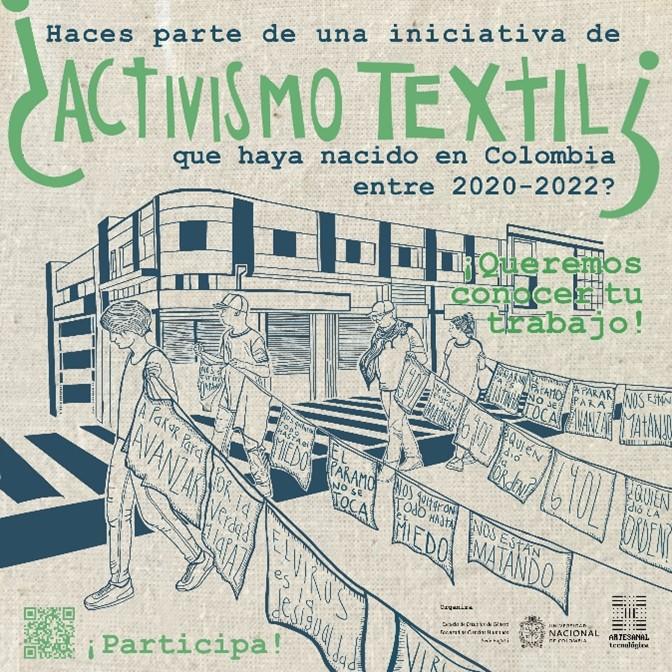
Laboratory "A Textile View of Social Mobilization," Bogota
The purpose of this laboratory was to generate a space for socialization, speculation and experimentation through a collage and photo-embroidery workshop, in order to weave multiple views and experiences on what the textile embodies and makes possible in the street, the house and the square as clothing, company and form of expression of the social denunciations that emerged during the social upheaval of 2021 in Colombia.
This space was held on June 24, 2023 at the National University of Colombia UNAL, Bogotá headquarters; 13 people with diverse experiences participated: activists linked to the Artesanal Tecnológica seedbed, photographers who documented the social upheaval in Colombia and textile creators.
From a methodology of collective creation, it was proposed to the participants, prior to the laboratory, to select a photograph from those received in the public call made virtually between March and June 2023: "A textile view of social mobilization in pandemic times" with which they would be connected. For the day of the meeting, they were asked to bring a textile garment that accompanied them during the protests and social mobilization.
In the space, the participants shared their memories of the mobilization and those of their garments, and intervened the photograph previously selected by them with the photo-embroidery technique. The active listening, the exchange of experiences and the link with the materialities generated a space conducive to the creation of a collage that established relationships and bonds, through the spatial location and a series of colored threads, the intervened photographs and the garments. The result was an ephemeral collage-installation that allowed the construction of shared meanings and interpretations about the place that textile has in social mobilization, revealing it as territoriality, body, language, collective struggle and care. This creative and analytical input will be part of a visual essay on the place of the textile as clothing, company and form of expression of the social denunciations that emerged during the social upheaval of 2021 in Colombia.
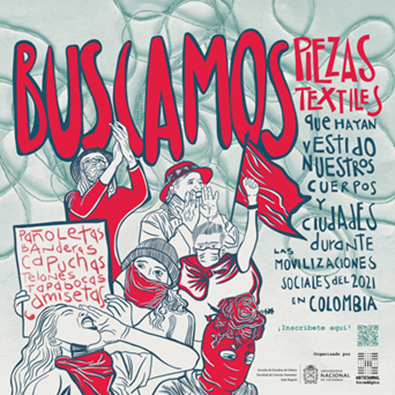
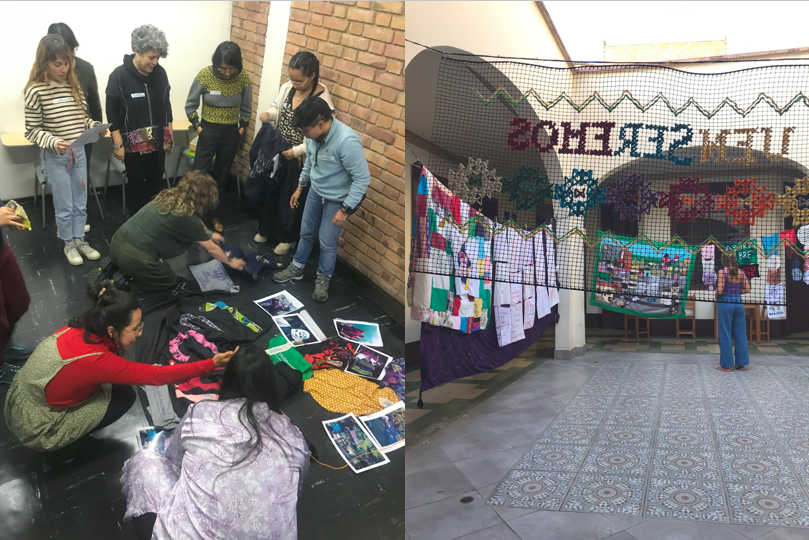
Presentation of CGU initial findings (29 June 2023)
On Thursday 29th of June, Dr Ewan Kerr presented initial findings gathered from Glasgow Caledonian University's (GCU) work on Cluster 1 and Cluster 2. Entitled 'Civil Society and Social Movements During Crisis: Mechanisms of Alternative Governance?', the presentation was delivered to over 100 senior civil servants, policymakers and government analyst professionals from across the UK government and devolved administrations as part of the ESRC-GSR's Actionable Insights Seminar. Drawing upon research findings, the presentation argued that COVID-19 was an important stress test for the institutions and processes of governance in Scotland the UK, from which they did not emerge without fault.
It noted how the transformation of the state over the recent past has limited effective governance practices and undermined emergency response to crisis situations. Evidence drawn from expert interviews and analysis of the response to the pandemic indicates that the long-term ability of state-governance actors to address serious social challenges requires further exploration of innovative and creative institutional reform of governance mechanisms. For example, civil society organisations, (including social movements and trade unions) should be empowered to proactively identify, assess, and mitigate risks – as well as increase accountability of decision-making processes. Moreover, by feeding into policy formulation, implementation and accountability, civil society organisations can foster greater resilience to future and ongoing crises.
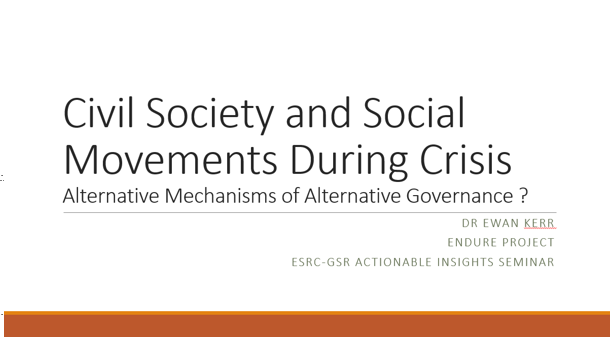
ENDURE's Annual Meeting held in Zagreb (15/16 June 2023)
The annual meeting of the ENDURE project was held in Zagreb on 15 and 16 June, hosted by IRMO. The meeting was combined with a workshop to discuss the research conducted on governance responses to the Covid-19 pandemic and the effects of demobilising economic, political and social activity (lockdowns), as well as the emergence of new forms of mobilisation with widely varying ideological framing, which emerged against the backdrop of global pandemic control and state-regulated lockdowns. Discussion at the annual meeting focused on research progress and comparative analysis in Brazil, Germany, Colombia, UK, Canada, Finland, USA, Croatia, Poland, Romania and Turkey. Partners also discussed different dissemination, strategies and publication pathways for research.
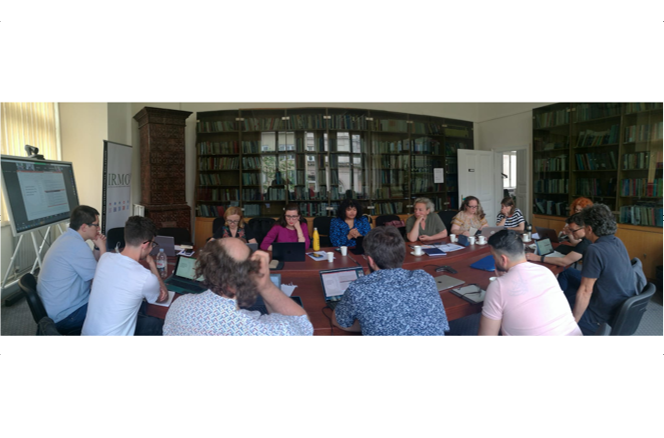
Cluster 2 biographical interview analysis workshop-V organized online (15 March 2023)
In the fifth round of the biographical interview analysis workshop, the team members in Cluster 2 focused on an interview conducted by Christian Fröhlich (FU Berlin team) with an elementary school teacher in Berlin.
Cluster 4 workshop in Wrocław (24-28 April 2023)
On 24-28 April, another meeting was held as part of Cluster 4's activity 'Mobilising (d/mis)information and communities: Governance Rhetoric, Polarisation and Empathy'. This time the meeting took place at the University of Wrocław, where the Polish team led by Dr Mateusz Karolak hosted Dr Emilia Palonen from the University of Helsinki and Dr Christian Fröhlich from Freie Universität Berlin. The attendance of Dr Palonen was linked to her five-day visit to the Institute of Sociology at the University of Wrocław, where she also gave a lecture on Ideology and Discourse Analysis. All teams worked intensively on the integration and preliminary analysis of data collected from Twitter. A full-day methodology workshop was held on Friday 28 April, which was also attended by other team members (Dr Piotr Pieńkowski, Dr Kleber Carrilho and Juho Pääkkönen). Special thanks to Dr Matti Pohjonen from University of Helsinki, who led the Tableau software training.
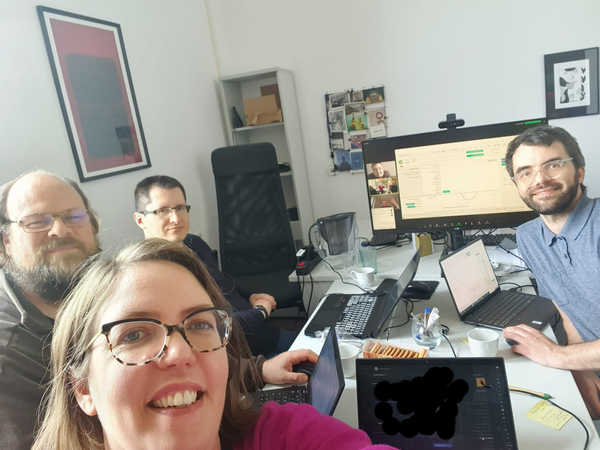
Cluster 2 biographical interview analysis workshop-IV organized online (17 April 2023)
In the fourth round of the biographical interview analysis workshop, the team members in Cluster 2 focused on an interview conducted by UNICAMP team in Brazil.
Cluster 2 biographical interview analysis workshop-III organized online (20 March 2023)
In the third round of the biographical interview analysis workshop, the team members in Cluster 2 focused on an interview conducted by Dr Susan Rottmann (OzU) in Turkey.
Cluster 2 biographical interview analysis workshop-II organized online (20 February 2023)
In the second round of the biographical interview analysis workshop, the team members in Cluster 2 focused on an interview conducted by FU Berlin team member Mihai Varga in Romania.
ENDURE’s Biannual project meeting (9 December 2022) – Online
ENDURE team members evaluated the work progress and reviewed the time plan. In general, the first six months into the project were dedicated to preparatory work in all clusters. Team members developed their cluster guidelines, organised meetings and training workshops to discuss conceptual and methodological aspects of their cluster theme.
UNICAMP Researcher Marina Fontolan (Brasil) spends one month at the FU Berlin (November 2022); the research stay received generous funding from the Berlin University Alliance
Cluster 2 biographical interview analysis workshop (9 November 2022) and Cluster 4 preparatory workshop (10 November 2022)
ENDURE team members working in Cluster 2 and 4 organised a two-day workshop in a hybrid format. On the first day, workshop participants analysed together a biographical interview done by the UWrocław team. The session was organized to discuss the anonymized biographical narrative interview conducted with an essential migrant worker, who used to work in food delivery during COVID-19 pandemic in Poland. Three main directions of analysis of this biographical interview which was transcribed and translated into English were identified and discussed during the meeting: essentiality of work, inequality, its effects, and consequences during pandemic as well as resilience in different crisis situations from biographical perspective. The Cluster members also discussed the next steps within the Cluster, the availability of following meetings, and decided to have such data analysis workshops periodically and preferably each month. The meeting was organized in a hybrid mode involving the other members of the team across the ocean via Microsoft Teams platform.
On the second day, the Cluster 4 team, led by University of Helsinki and Unicamp in Brasil organised a preparatory workshop to discuss further the research design.
Training workshop on Biographical Interview Method & Kino-eye (26-27 September 2022)
ENDURE team members gathered at the University of Wrocław for a two-day workshop (26/27 September 2022) on biographical interview method applied in Cluster 2 research. The training was provided by our colleagues at University of Wrocław, Adam Mrozowicki and Mateusz Karolak. Lead-PI Mihai Varga and his FU Berlin colleagues Christian Fröhlich and Ignacio Sar Chavez also attended the workshop. The rest of the team members joined the sessions online. In the second day of the training, the kino-eye method was introduced by our team member at Istanbul Ozyegin University, Susan Rottmann.
An exemplary kino-eye project presented by her is available here. This video is a kino-eye film, made by a Syrian refugee in Istanbul, Turkey, in January 2023. Kino-eye is an action research methodology in which participants freely express themselves through self-filming. After a short training, they choose what to share and how. Kino-eye films like this show us important dimensions of how people perceive their own cultural contexts and what is meaningful to them in their lives. Look for more films to be posted here soon!
ENDURE: the project started…
The ENDURE project started on June 1st, 2022, funded by the Trans-Atlantic Platform (T-AP) Recovery, Renewal and Resilience Call by the following public funding organizations: DFG (Germany), FAPESP (Brazil), AKA (Finland), HRZZ (Croatia), MINCIENCIAS (Colombia), NCN (Poland), NSF (USA), SSHRC (Canada) and UKRI-ESRC (UK)
The consortium met on June 9-10th of June, 2022 for the project kick-off meeting at Freie Universität Berlin to present and review the project objectives, activities, and work plan. The majority of the partners were present at the meeting. Several team members and our advisory board members joined online in several sessions.
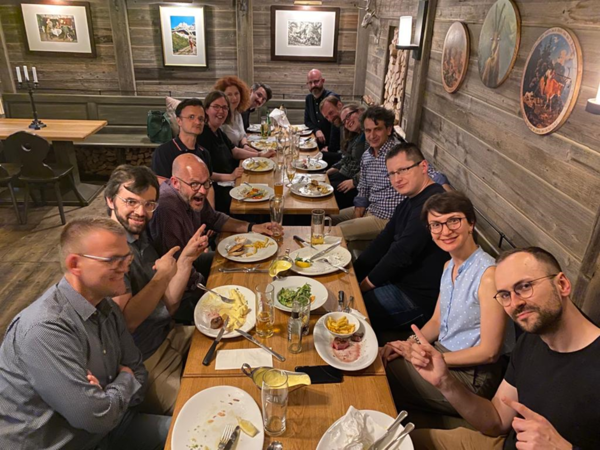
The annual meeting of the Society for Social Studies of Science (4S) was held in Honolulu, Hawaii, in November 2023.. For this conference, Marina Fontolan, Carla Ladeira Pimentel Aguas, Soner Barthoma, Leda Maria Caira Gitahy, and Mihai Varga organized a panel entitled Social aspects of the Covid-19 crisis: Inequalities, Resiliences, and Knowledge Production. The panel abstract is the one that follows[1]: “The Covid-19 crisis had affected the entire world differently. World inequalities became more apparent than ever before. Even today, not all countries and regions of the world have reliable access to Covid-19 vaccines, medicines, masks, oxygen or even information. This panel aims at discussing the Covid-19 crisis from a Science and Technology Studies perspective: thinking about the mid and long term effects of this crisis from the most varied STS perspectives. We are looking for papers that discusses issues related (but certainly not limited) to: Drivers of inequalities and new forms of (de-)mobilizations: how the various dimensions of inequalities (gender, race, ethnicity, age, and migratory status) have been reinforced or challenged during the pandemic; How different communities built resilience strategies to survive through the study of grassroots solidarity movements and the mobilization of social groups and communities to generate social and political collective action; Governance and (De-)Mobilization: to analyze Covid-19 governance in different instances, exploring social, political and ethical consequences of these governance practices on social inequalities, political systems, people's rights, and freedoms across the globe; Social Media and the Covid-19 pandemic: the sources and promotion of dis and mis-information (as well as resistance discourses in form of public science and science disclosure endeavors) in social and mainstream media and to assess social media's empowering and repressive roles in the context of the pandemic”.
The panel included a total of 15 presentations and allowed for in-depth discussions on the social issues of Covid-19. It was divided into 3 interrelated sections that allowed us to explore several of ENDURE project's research themes..
The first section had a focus on social media and mask making. The papers presented on social media allowed us to better understand how disinformation circulates and how it is similar in nature and content, becoming an arena to demand changes in policy and how the pandemic should be tackled.. The paper on mask making showed how people initially perceived cloth masks as a safe option and continued to use them, even in combination with surgical masks when they realized they were not as effective as they had hoped be.
The second section featured papers that focused on long covid challenges, expertise and technological issues of the pandemic in general. The paper on long covid showed how this is becoming a neglected disease: people who suffer from it do not usually receive appropriate care and are usually dismissed by their loved ones as their families do not understand or do not want to deal with the reality that Covid-19 is still a problem. The papers on expertise discussed how the idea of who is the expert was constructed throughout the pandemic and how they were held accountable by changes in policies. The paper on the use of contact technology showed how the use of apps spur into making inequalities clear: people without access to smartphones and the elderly felt constantly excluded from their right to come and go.
The final section focused entirely on policy making during the pandemic. The papers showed how governance was carried out during the worst moments of the crisis, and how knowledge production and contested data came into play in developing policies to contain the pandemic. These experiences showed how geopolitical challenges and issues were both at the forefront and in the background of several decisions taken.
In conclusion, the panel held a great diversity of papers that showed how Covid-19 is still an issue and how the pandemic has made the theme that is still in need of further research.
[1] Published at: https://4sonline.org/news_manager.php?page=31384


